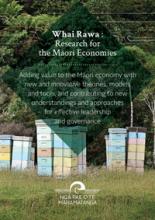What do alternative models to tribal corporations look like for iwi and hapū development?
A wealth of historical narratives provide alternative examples of successful tribal economic development and management practices that have existed in the past. However, the last two decades have seen the emergence of a commercially successful corporate-beneficiary model in which the majority of Treaty of Waitangi settlement assets have become centralised within corporate structures.
These structures have been criticised for resource centralisation and fears exist that settlement corporations may become self-serving, thereby failing to meet the economic and social needs of constituents.
This project aims to examine, develop, synthesise and communicate case study examples of alternative structures to the corporate-beneficiary model for supporting tribal economic development.
The research will help catalogue the economic impacts, either negative or positive, of corporate-beneficiary frameworks on tribal communities, will provide contemporary examples of alternative models of iwi/hapū economic development and will demonstrate how alternative models are utilising new technologies, Western science, and mātauranga Māori to improve the lot of their communities.
Objectives of the Research:
- Explore how well the corporate-beneficiary model contributes to te Ao Māori and employs practices that are consistent with mātauranga and tikanga Māori.
- Examine and understand alternative iwi/hapū models of development use practices that are consistent with mātauranga and tikanga Māori and how they contribute to te Ao Māori.
- Promote the uptake of models consistent with mātauranga and tikanga Māori for optimal economic development for iwi/hapū institutions.
